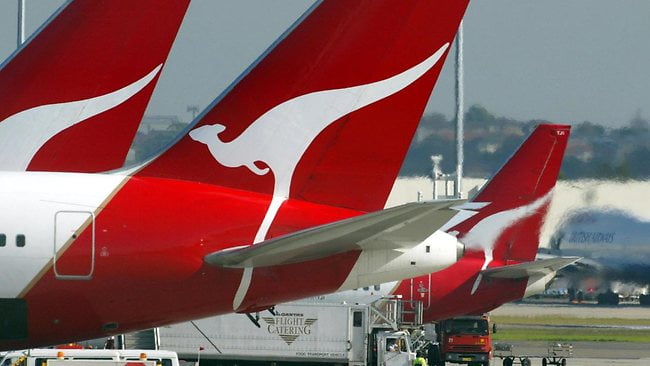Qantas has today announced a “record first-half net profit” of $607 million (£342 million, €386 million, $US473 million). The result is an 18% improvement on the previous half year (Australia’s financial year runs 1 July – 30 June). The “underlying before tax” profit was $976 million (£551 million, €621 million, $US763 million).
Media Release: Qantas Group half year results announcement >> https://t.co/SBnSR6FZKZ
— Qantas (@Qantas) February 21, 2018
Revenue was up 5.8% to $8.6 billion (£4.9 billion, €5.5 billion, $US6.7 billion). Qantas Domestic was up 20% to $447 million (£252 million, €285 million, $US349.5 million) with Jetstar up 16% to $318 million (£179 million, €202 million, $US249 million). Qantas International was down 6% to $222 million (£125 million, €141 million, $US174 million) with Qantas Loyalty up marginally at 2% to $184 million (£104 million, €117 million, $US144 million). During the same period Qantas domestic capacity was reduced by 3% and fares were increased by 8%, with possible further fare increases, dependant on the economy.
Qantas posts $607m first-half profit https://t.co/pZGAbTKXQw
— ABC News (@abcnews) February 21, 2018
The airline’s fuel bill increased by $58 million (£33 million, €37 million, $US45 million) to $1.54 billion (£870 million, €980 million, $US1.2 billion).
At a press conference, CEO Alan Joyce said the profit “comes in the face of some challenges — higher fuel costs, a competitive domestic market and international capacity growth. Despite that, Qantas Domestic had a record result, Jetstar Group had a record result and Qantas Loyalty had a record result. Qantas International held its own in a market that is producing some extremely low airfares.”
Qantas expects capacity on domestic flights to fall 1% in the second half with international capacity rising 2-3%.
The results lifted Qantas share price 9.2% to $5.76 (£3.25, €3.67, $US4.51).
In a week where there has been debate about some of Australia’s biggest companies not paying corporate income tax, including Qantas, the airline’s interim financial report showed a tax expense of $250 million (£141 million, €159 million, $US196 million), “but will not pay tax due to the ‘utilisation of carry-forward tax losses and other temporary differences.'” Mr Joyce said that the airline may be in a position to start paying tax from 1 July if this year’s performance is the same as last years.
Qantas will also start taking delivery of new A320s by the end of 2022 to renew it’s Jetstar fleet.
Today we announced our plans to open the Qantas Group Pilot Academy in 2019. Register your interest today > https://t.co/xXf7HCsUKn pic.twitter.com/EmEg4fqiC1
— Qantas (@Qantas) February 21, 2018
As part of the announcement Qantas said it would invest $20 million (£11 million, €13 million, $US16 million) in the 2019 financial year to start a pilot academy to address the shortage of pilots. The academy could become the biggest in the southern hemisphere and could be leased out to other airlines. Boeing expects 640 000 new pilots will be required in the next 20 years, with 40% of those in the Asia region.
A $378 million (£213 million, €241 million, $US296 million) share buy-back was also announced.
